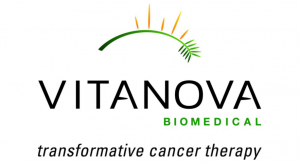Innovation: Therapeutics
Targeted Cancer(s): Prostate cancer
Leadership: Tom Roberts, CEO; Matt Gdovin PH.D., CSO & FOUNDER (Click here to view our team)
Stage of Business: Preclinical

Vitanova Biomedical has developed a cancer therapy platform technology based on the ability to cause Light-Activated Intracellular Acidosis (LAIA) therapy and pH-induced cancer cell death. In vitro studies have proven LAIA therapy capable of causing cell death in five different cancer cell types including pancreatic, triple negative breast, and prostate cancer. Additionally, in vivo studies in a nude mouse model utilizing triple negative breast cancer have proven LAIA therapy capable of reducing tumor volume and doubling survival with no adverse effects.
Vitanova Biomedical’s first targeted compound, VNBp-1, will only bind to and enter prostate cancer cells. Preliminary in vitro data show VNBp-1 can create acidosis and decrease prostate cancer cell viability in response to photo activation. LAIA therapy with VNBp-1 will cause prostate-specific cancer cell death in a targeted manner, reducing damage to nearby non-cancerous healthy tissue, and eliminating the unwanted side effects associated with surgery, external beam and internal radiation therapy. Lastly, LAIA therapy with VNBp-1 will prevent the consequence of cancer progression to a more advanced clinical state resulting from Active Surveillance.
In the U.S., in 2018, the total prevalence of men diagnosed and living with any stage of prostate cancer was roughly 3.3 million patients. Additionally, there were approximately 164,690 new prostate cancer patients and 29,430 resulting deaths. Lastly, over 80% of all prostate cancer patients are being diagnosed with local prostate cancer.
As the standard of care, men diagnosed with local prostate cancer have three therapy choices:
Fifteen years after either prostatectomy or radiation therapy, prostate cancer patients had urinary incontinence (18.3% and 9.4%, respectively), insufficient erection for intercourse (87.0% and 93.9%, respectively), and bowel urgency (21.9% and 37.7%, respectively). In respect to active surveillance, 32.6% of prostate cancer patients diagnosed with local prostate cancer would progress to the “biochemical failure clinical stage” of prostate cancer.
Traditional cancer therapies are associated with unwanted side effects, negatively impacting the patient’s quality of life. Surgery, radiation and chemotherapy cause damage to healthy non-cancerous cells. Additionally, cancer cells often develop a resistance to chemotherapeutics. To date, there are no known mechanisms by which cancer cells can develop resistance to a rapid, significant intracellular acidosis. Vitanova Biomedical’s platform compound alone is not cytotoxic and delivery of the light alone does not cause any cell death. LAIA therapy eliminates damage to non-cancerous cells by utilizing cancer-specific targeting to deliver the compound to only cancer cells.
In addition to a first-line treatment for cancer, LAIA therapy offers patients a viable treatment option if they are not a candidate for surgery, have a tumor in an inoperable location, or have exceeded the maximal dosage of radiation.

